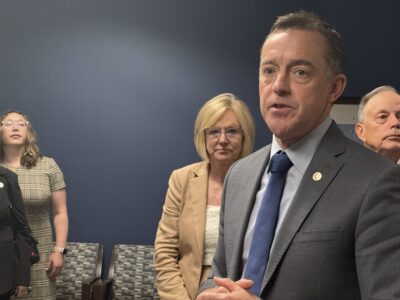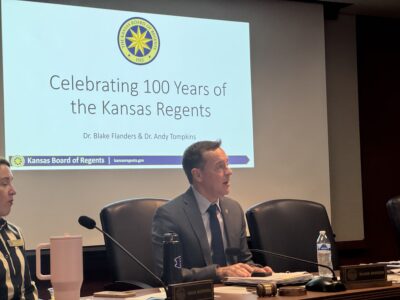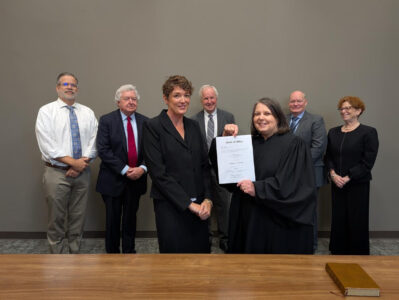Regents approve new policy on how to pay university leaders, table decision on whether to provide raises next year

photo by: Shawn Valverde/Special to the Journal-World
The University of Kansas campus is pictured in this aerial photo from September 2023.
There was an expectation Thursday that the chancellor and university presidents might get raises from the Kansas Board of Regents. Instead, Regents delivered — without any discussion — a new policy on how the leaders of the state’s universities should be paid, and left open the question of whether those raises are yet to come.
In their final regularly scheduled meeting of the state’s fiscal year, Regents had on their agenda to act on fiscal year 2026 CEO compensation, which refers to the salaries for University of Kansas Chancellor Douglas Girod, and the presidents of Kansas State, Wichita State, Emporia State, Fort Hays State and Pittsburg State universities.
Regents met for nearly four hours in a closed-door executive session, and then emerged to say that they would table any action on compensation for the chancellor and presidents. Then a motion was made for the board to consider a “compensation philosophy” that had been considered by a Regents subcommittee at an earlier date. The motion went on to direct the board to incorporate that compensation philosophy into the board’s official policy regarding compensation for university presidents.
The board unanimously approved the changes to the policy, which was not part of the board’s published agenda, but was added by the board just prior to the vote. No substantive board discussion nor staff presentation about the proposed changes took place prior to the board taking its vote.
Shortly after the meeting, the Journal-World asked for and received a copy of the amended policy. The policy replaces a fairly general one-paragraph description of how the Regents will set the compensation of university CEOs with seven paragraphs of more detailed instructions on what Regents should consider.
It is not clear whether the new policy is likely to result in larger or smaller raises for university CEOs going forward.
The previous policy gave Regents instructions to “reward excellence and promote retention of outstanding leaders” by considering the performance of a CEO, reviewing compensation of presidents at peer universities and taking into account “other relevant market data” or any other information deemed relevant by the board.
The new policy continues to allow the board to consider any information it deems pertinent. But the new policy creates several “guiding principles” that go into more specifics. Those include:
• Internal equity is a foundational principle,” the new policy states. “Compensation decisions shall be fair, consistent and free from bias, reflecting each executive’s contributions to institutional success, regardless of personal characteristics such as gender or race.” No such language was in the previous policy, and in fact, it stated the Regents could “establish compensation for the chief executive officers in a manner that is consistent for the group or, as appropriate, on an individual basis.”
Regents provided no comment about why they inserted that language into the new policy. Salaries among the university CEOs vary widely, as do the sizes of several of the state’s universities, although differences in salary among universities of similar size also are evident.
• The Regents will review each university’s group of peer institutions at least every three years and will set a group of “pay bands” that are 25% above and 25% below the median salary of the peer group. Regents also will specifically look at how close each CEO is to the median of his or her peer group. “Executive compensation is aligned with the 50th percentile of national market rates to ensure that the state universities remain competitive in attracting and retaining top leadership talent.”
Regents did not publicly discuss how the state’s current CEOs compare to the medians in their peer groups.
• “The Board embraces a pay for performance model, recognizing that compensation should reflect both market alignment and individual achievement,” the new policy states. The policy also states that annual salary adjustments can be impacted by “fiscal constraints” and “labor market dynamics.”
It is not entirely clear what all the university CEOs currently are paid. The Journal-World asked staff at the Board of Regents for a summary on Thursday afternoon, but had not received any information as of 5 p.m. Thursday. The website Kansas Open Gov, which states it uses open records request to obtain its information, listed the following 2024 pay totals for university CEOs.
• Douglas Girod, KU: $879,377
• Richard Linton, Kansas State: $826,500
• Richard Muma, Wichita State: $780,000
• Ken Hush, Emporia State: $464,730
• Tisa Mason, Fort Hays State: $379,501
• Daniel Shipp, Pittsburg State: $295,000
Last year, the Regents awarded raises to each university CEO, ranging from 4% to 6%. Girod and Shipp topped the list at 6%. State legislators approved a 2.5% wage increase for most general university employees last year.
When and whether university CEOs will receive a raise for the coming year is unclear. In delaying the vote on the matter, the board did not set a date to bring the issue up again. Both the previous policy and the new policy say compensation for university CEOs should be set by June 30, which is one day before the state’s fiscal year begins. The Regents don’t have another meeting scheduled before June 30, but do have the ability to call a special meeting.
The Journal-World also asked a spokesman with the Regents for clarification on whether the compensation philosophy approved by the board on Thursday had ever been discussed in an open meeting of the Regents Governance Committee, or whether all such discussion was held in a closed-door executive session of the committee. The Journal-World hadn’t yet received a response as of 5 p.m. Thursday.







